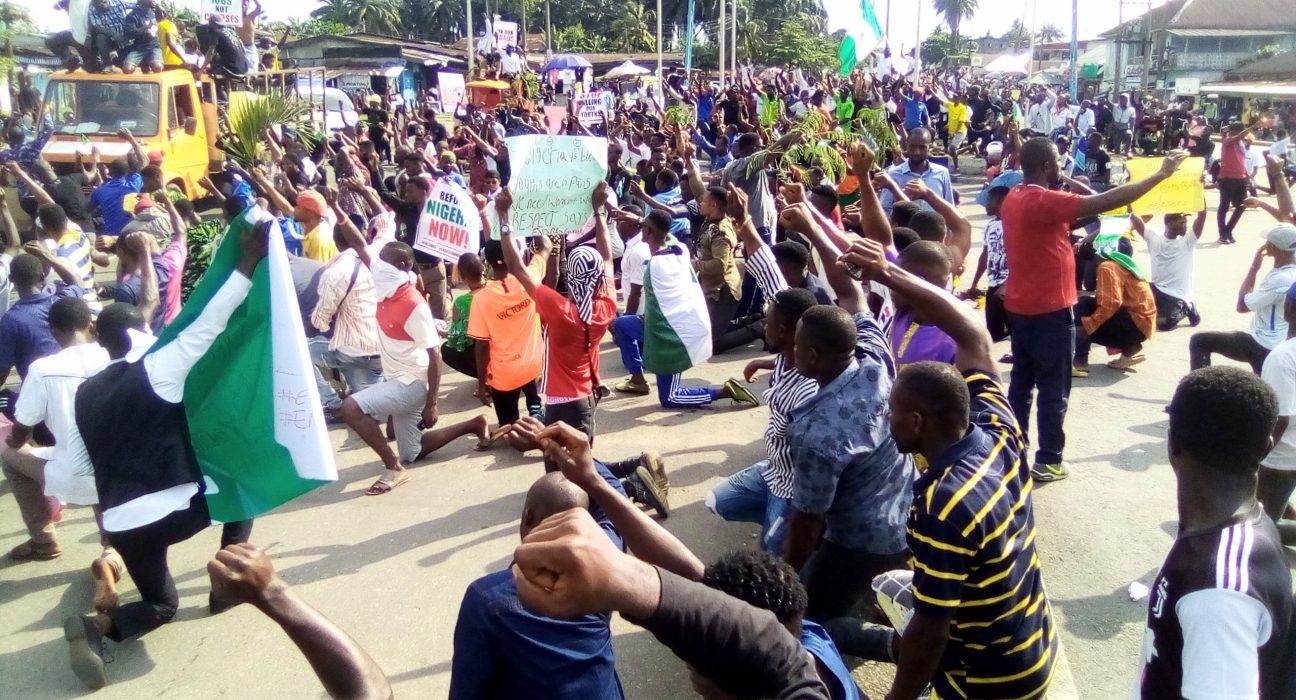By Frank Ulom, Converseer
Residents of Cross River State have taken to the streets to strongly criticized the state of Nigeria’s democracy and economic policies, describing the situation as a “renewed shege” rather than the “renewed hope” promised by the current administration.
Some of the residents who took to the streets were carrying placards with inscriptions like: “Reverse all anti-people neo-liberal policies #June12 #EndHardshipInNigeria”, “What is the value of the lives of Nigerians? #StopTheKillings”, “Unemployment is driving our youths into criminality #EndUnemployment”, “Renewed hope? Abi na renewed shege?” “We are starving! We are suffering!! We are dying!!! Naija which way?” “#EndHardship – We can’t even afford agbado!!!” “Democracy? Impunity, oppression and dehumanization reign supreme!!!”
Speaking during a peaceful demonstration on the state of the nation on June 12 in Calabar, the State capital, South South Coordinator of the Take-It-Back (TIB) Movement, Jonathan Ugbal, said although Nigeria has marked over 26 years since the beginning of the Fourth Republic on 29 May 1999, the benefits of democracy have not reached the ordinary people. He quoted the late Afrobeat legend, Fela Anikulapo Kuti, asking whether Nigeria was practising democracy or “a demonstration of craze”.
According to him, despite official statistics from the Nigerian Bureau of Statistics (NBS) claiming economic growth, the reality is widespread poverty, unemployment, and hardship. “We are living in a country where our Human Development Index is abysmal, and the so-called trickle-down economy only favors the feudal capitalist system. The common man is not benefitting,” Ugbal said.
He highlighted the removal of fuel subsidies, devaluation of the Naira, and the increase in electricity tariffs as policies that have worsened the economic conditions for Nigerians. Ugbal also criticized the introduction of food-related slogans like “ewa and agbado” as job creation strategies, saying many Nigerians cannot even afford such basic items.
Ugbal lamented that insecurity remains rampant despite billions spent on defence. “Everyday banditry is increasing, insurgency is increasing, and now new terrorist factions are emerging. What does that tell you?” he queried.
He decried what he called the persecution—not prosecution—of dissenting voices and ideological opposition. “We are not talking about the opposition parties like PDP or Labour. We are referring to those with alternative ideological views being silenced. Critics are being cracked down on. This is not democracy.”
Ugbal demanded the reversal of what he termed “anti-people neoliberal policies” such as deregulation, privatization, and subsidy removal. “These policies have only increased government revenue without improving the lives of Nigerians,” he said.
He also expressed frustration over the government’s handling of education, accusing it of neglect and commercialization. “Why is the government offering loans instead of funding education and reversing fees? Other oil-producing countries are investing in their people. Why is Nigeria different?”
On job creation, Ugbal said the government should focus on creating an enabling environment rather than directly creating jobs. He noted the high cost and difficulty of doing business in Nigeria, citing regulatory bottlenecks, multiple taxation from local and state authorities, and poor infrastructure as barriers. “Even after registering a business with CAC, the challenges are far from over. The environment is not thriveable,” he said.
Jonathan referenced the increasing cost of food and daily living, saying more than 100 million Nigerians face food insecurity, with nearly half of the population spending most of their income on feeding alone.
Ugbal called on the Nigerian government to prioritize governance and the welfare of the people, stating, “We are not even asking for good governance, we are asking for governance—basic governance that ensures welfare and security. This suffering is inhumane. This is not the country we want.”
Speaking also, a commercial minibus driver, Ini Michael Etim, said he doesn’t like the fuel system implemented by the President Bola Tinubu-led government. “I don’t like the fuel system because it’s causing hardship,” he said.
Another commercial minibus driver, Henry, said his concern is the high price of fuel (petrol) as well as the increased taxation by the Cross River State Government.
“For Tinubu’s government, his policies, I think is okay (sic) but the man needs to consider the masses too. My problem is the fuel. Fuel at N900 for me is too expensive. Fuel should be N500 or N600, that’s the problem I have.
“Our governor here is not trying in Cross River State – we pay a lot of taxes here, even on holidays like this, we’re still buying tickets, which is not supposed to be so,” he said.
Since You Are Here, Support Good JournalismCrossRiverWatch was founded on the ideals of deploying tech tools to report in an ethical manner, news, views and analysis with a narrative that ensures transparency in governance, a good society and an accountable democracy. Everyone appreciates good journalism but it costs a lot of money. Nonetheless, it cannot be sacrificed on the altar of news commercialization. Consider making a modest contribution to support CrossRiverWatch's journalism of credibility and integrity in order to ensure that all have continuous free access to our noble endeavor. CLICK HERE |
New Feature: Don't miss any of our news again.Get all our articles in your facebook chat box.Click the Facebook Messenger Icon below to subscribe now
Text Advert by CRWatch :Place Yours

Will You To Learn How To Make Millions Of Naira Making Special Creams From Your Kitchen?.Click Here
Expose Your Business And Make More Sales. Advertise On CrossRiverWatch.com Today



Leave feedback about this